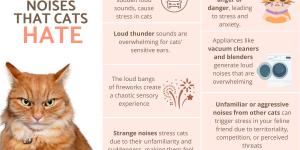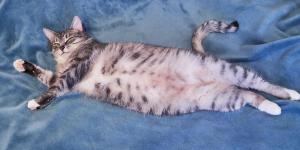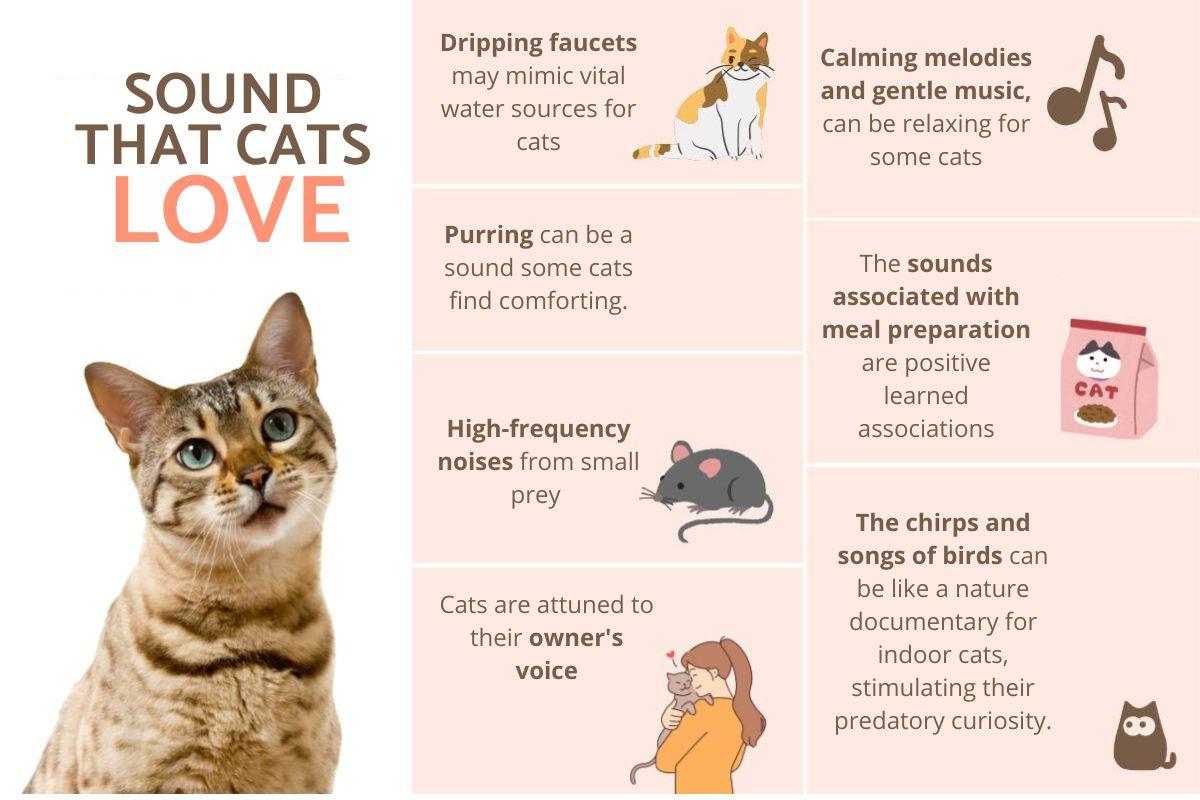Which Sounds Do Cats Love?

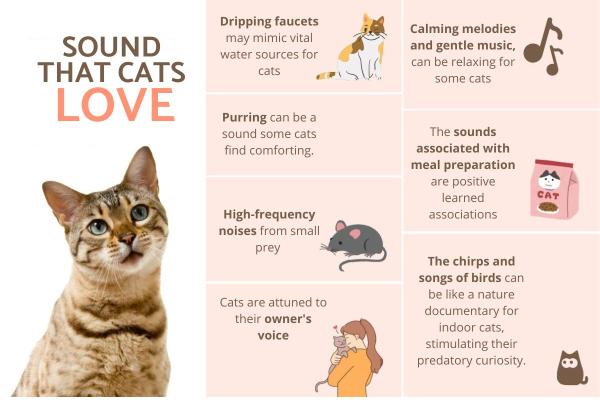

See files for Cats
At AnimalWised, we frequently emphasize the importance of environmental enrichment for feline well-being. Providing a variety of toys and stimulating activities helps prevent stress, boredom, and behavioral problems in cats. But did you know that sound can also play a role in enriching your cat's life?
This article explores sounds that cats love and how you can use them to create a more engaging environment and potentially improve communication with your feline friend.
Dripping water
The sound of a dripping faucet can be like a siren song to some cats. Cats descended from desert-dwelling ancestors who relied on finding clean, moving water sources for survival. Stagnant water could harbor bacteria and parasites, so fresh, flowing water was not just refreshing, but potentially life-saving. In this sense, we can say that the sound of dripping water might trigger an instinctual response in some cats, a subconscious recognition of a potentially vital resource.
Furthermore, running water tends to be more aerated than stagnant water, which can make it taste fresher and more appealing. While we may not notice a huge difference, a cat's sense of taste is more acute than ours. The sound of dripping water might subconsciously signal a source of tastier, more oxygenated hydration.
It's important to note that not all cats are enthralled by dripping water. Some might find it annoying or even scary.
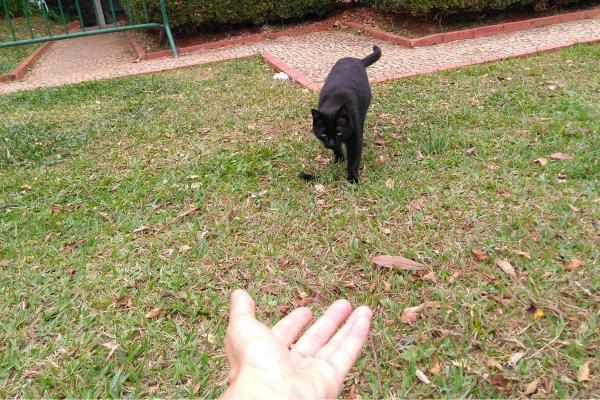
Sounds mimicking prey
Studies reveal a fascinating aspect of feline behavior – their preference for sounds in the high-frequency range, around 85 kHz. This seemingly arbitrary number aligns perfectly with the natural squeaks, chirps, and buzzes emitted by small prey like birds, mice, and insects. These sounds, inaudible to human ears, are a beacon for a cat's hunting instincts.
This explains why your cat might appear transfixed on "nothing." In reality, they're intently focused on a potential meal, its subtle movements escaping our human senses. Interestingly, kittens aren't born with an inherent desire to hunt rats or mice. Their intense response stems from the high-frequency movements and communication these rodents use, triggering the cats' predatory instincts.
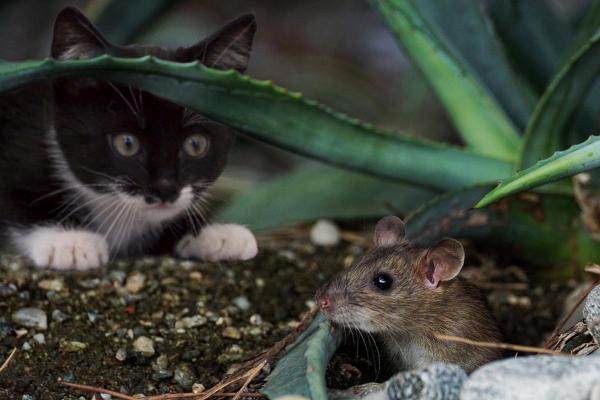
Purring
Purring, more akin to a gentle vibration than a distinct sound, plays a pivotal role in the optimal development of cats. Firstly, it aids in meeting their physiological requirements during a period when they rely entirely on their mother for survival. Secondly, it fosters a sense of security during a phase of vulnerability when they are incapable of self-care.
As cats transition into adulthood, the significance of purring becomes more multifaceted. While they often purr when relaxed and content, cats may also purr when feeling fearful or uncertain, particularly in unfamiliar environments. This is because purring retains its calming effect into adulthood, serving as a natural relaxant for cats in various situations.
Your voice
Cats possess remarkable abilities to distinguish between individuals. Leveraging their acute senses, they can identify your unique scent, recognize your tone of voice, and even discern the sound of your footsteps based on your gait. Establishing a bond of affection and trust further amplifies their affinity for sounds associated with your presence, providing comfort and reassurance.
During times when your cat becomes agitated or stressed, engaging in soothing conversation or singing a gentle melody can aid in calming them down effectively.
Moreover, it's important to acknowledge that cats are adept at interpreting human body language and detecting shifts in mood. Thus, when you experience emotions like sadness, anxiety, anger, or fear, your cat is likely to adjust its behavior accordingly. For instance, if your cat senses your anger, it may maintain a cautious distance to prevent potential conflicts. Conversely, if you're feeling down or unwell, your cat may offer companionship by curling up beside you, expressing its affection and solidarity. One of the most gratifying sounds for cat guardians is the gentle purring of their feline companions, often heard in moments or settings where the cat feels content and secure. This positive association stems from the communication dynamics between newborn kittens and their mother during their initial weeks of life. The mother cat purrs during childbirth to soothe herself and continues to purr post-delivery to comfort, guide, and reassure her litter, particularly during the neonatal phase when the kittens are still blind. In turn, newborn kittens purr to convey their needs and emotional state to their mother.
Soft music
Cats, known for their picky palates, also have discerning taste in music. Their superior hearing, picking up frequencies beyond human ears, makes loud noises stressful. Conversely, soft melodies can be incredibly calming, even helping with behavioral issues.
Music therapy designed for cats leverages their unique hearing range and vocalizations. Often, this involves adapting classical compositions. This tailored approach has shown promise in calming anxious felines. So, next time you anticipate loud noises like fireworks, consider closing windows and doors. Playing classical music softly in the background can create a tranquil environment, reducing the impact of external disturbances. Offering companionship and reassurance can further enhance your cat's sense of security during these noisy events.
Sounds of food
Domestic cats exhibit a well-documented behavioral response to sounds associated with food preparation and mealtimes. Studies have shown that cats are particularly drawn to high-pitched sounds like sizzling meat in a pan. This heightened interest likely stems from a combination of factors.
Firstly, cats possess an exceptional sense of smell, estimated to be 14 times more sensitive than a human's. High-pitched sounds, such as sizzling, may act to intensify the aromas emanating from food, making it even more detectable and appealing to a cat.
Secondly, cats are intelligent creatures capable of forming associations between stimuli. Over time, they learn to connect the sounds of food preparation, like the crinkling of treat bags or the clatter of kibble in a bowl, with the subsequent reward of receiving a meal. This learned association triggers a heightened state of alertness and anticipation in the cat.
It's important to note that while cats may display a strong interest in human food preparation sounds, it's crucial to offer them a species-appropriate diet.
Sounds of nature
In nature, the hissing of the wind, the flow of bodies of water (streams, rivers, etc.), an insect or a bird flapping its wings, would catch the attention of cats. Despite being emitted at low frequencies, these sounds awaken the curiosity and hunting instinct of the kittens. And although your cat has never needed to hunt for food, these behaviors are instinctive and are transmitted from generation to generation through genes.
Therefore, do not be scared if, from time to time, your cat gives you dead animals. While this behavior may seem strange or repulsive to us, in cat language it is a good sign that your cat loves you and cares about your well-being. However, as we saw, it is important to take preventive measures to prevent your kitten from getting hurt or sick from contact with the blood or fluids of infected animals.
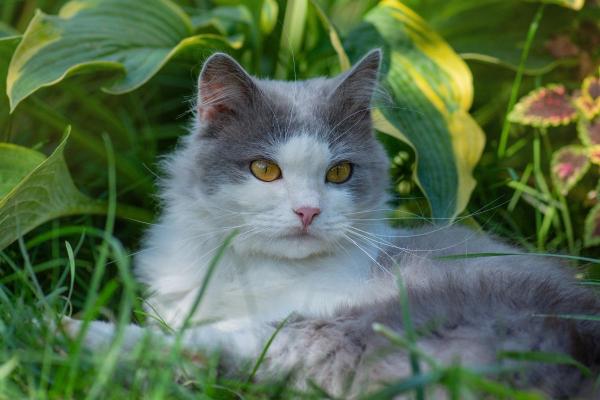
If you want to read similar articles to Which Sounds Do Cats Love?, we recommend you visit our Basic care category.
- Fanning, C. (2022). Why do cats love the “Pspspsps” noise so much? . Reader's Digest. Available at: https://www.rd.com/article/why-do-cats-love-pspspsps-noise/
- Heffner, R.S.; Heffner, H. E. (1985). Study on hearing of domestic cats. Hearing Research. Volume 19, Issue 1, pages 85-88. Available at: https://www.sciencedirect.com/science/article/abs/pii/0378595585901005?via%3Dihub
- Parsons MH., Banks PB., Deutsch MA. and Munshi-South J. (2018). T emporal and Space-Use Changes by Rats in Response to Predation by Feral Cats in an Urban Ecosystem . Front. Ecol. Evol. 6:146. doi:10.3389/fevo.2018.00146


